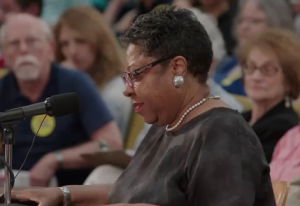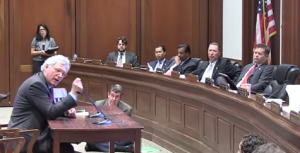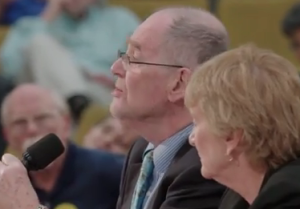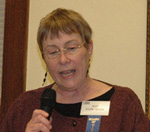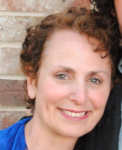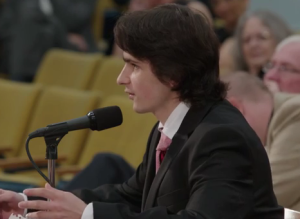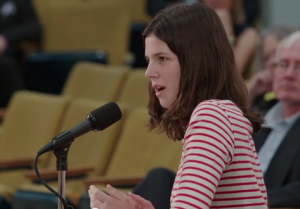There were so many of us — parents, students, teachers, school committee members, higher educators, former members of the Board of Elementary and Secondary Education — that they had to move the hearing on testing reform bills to a larger space. And we filled that one too!
It was a full day (seven hours!) of powerful testimony for a moratorium on high-stakes testing. Black Educators Alliance of Massachusetts and CPS member Barbara Fields was quoted in the Globe saying “The overuse and misuse of high-stakes testing has resulted in the denial of diplomas [to] economically disadvantaged children who desperately need a high school diploma to access a pathway out of poverty.”
CPS member Lou Kruger had the committee members on the edge of their seats. The Globe reported that “Louis J. Kruger, a professor of educational psychology at Northeastern University, said an MCAS score is not enough by itself to accurately assess student performance. ‘The MCAS . . . is one measure among many potential measures,’ Kruger said. ‘If we want a full picture of someone’s academic accomplishment, we have to use multiple measures, because any one measure is flawed.’
Here is just a sample of the excellent testimony:
* Barbara Fields, of Black Educators Alliance of Massachusetts and CPS, said, “BEAM is adamantly opposed to the current overuse and misuse of standardized tests and the extremely negative impact on all children but particularly children and communities of color. The overuse and misuse of high-stakes testing has resulted in denial of diplomas for our most economically disadvantaged children, who desperately need a high school diploma to access a pathway out of poverty; … a decline or lack of financial resources for course offerings or educational support services as more and more funds are expending on testing; the narrowing of an already limited curriculum in many inner city schools, where rigorous, culturally competent teaching and learning is required to eliminate the opportunity to learn gap; closings of schools, due to test results, causing some students to experience sometimes two and three times, the instability and emotional trauma of having their schools closed and the impact of being labeled a failure, over and over again.” Click here to see a video of her testimony.
* Juan Cofield, president of the New England Area Conference of NAACP, said, “NEAC has opposed high-stakes testing for many years. NEAC’s concern is that these standardized tests do not provide an adequate measure of student achievement and teacher effectiveness. While the goals of the High-stakes testing have been laudable, the tests have actually missed the mark and have served to stymie student achievement. Also, the tests have failed to be a pathway for better teaching in the classroom. The focus on these tests has distracted us from the primary objective of our educational system — to provide broad based education to meet the challenges of tomorrow.” Click here to read his testimony.
* Scott Lang, former mayor of New Bedford, said, “Standardized tests? I’ve never met a standardized kid. PARCC is forcing us to forfeit teaching citizenship, phys ed, history, and other subjects. Commissioner Chester miscalculates the problem of the unfunded liability, when kids fall off the school system and become wards of society.” Click here to see a video of his powerful testimony and here to read a transcript. (Thanks to Michael Gendre of the Common Core Forum for shooting and posting the video.)
* Holy Cross Professor Jack Schneider said, “If you want to talk about civil rights, let’s talk about the fact that schools are constantly stigmatized by the way that we hold schools accountable, and that as a result, well-resourced parents, who are quality conscious, do everything they can to get their kids out of schools that they often mistakenly believe to be bad schools because of narrow measures that fail to capture the true quality of the school, and that are often punishing those schools for the clientele they serve.” Click here to see video of his testimony and here to read his written testimony.
* James McDermott, a former member of the Massachusetts Board of Elementary and Secondary Education (BESE), said, “people should ask, “What do we want from our public schools?” If your answer is like mine that we want young people to become informed, thinking, and responsible citizens and that we want them each day to grow more just, more wise, more creative, more open, more courageous, more intelligent, more giving, more thoughtful, more tolerant, more free, more aware of their own unique potential – then give teachers, parents and students that message so we can start spreading that gospel – the first step, is to see the evidence that clearly shows that standardized testing too often creates policies that are actually hurting our own children and driving our best teachers from the profession.” Click here for video of his testimony and here to read his testimony. (Thanks to the MTA for this and other video from the hearing.)
* Tom Gosnell, President of the American Federation of Teachers Massachusetts, said, “We oppose excessive testing of students that leads to lost learning time, and we oppose what testing is sometimes used for. Sometimes it’s used to deny students diplomas. Sometimes it’s used to justify state creation of charter schools that siphon precious district resources from local schools. And sometimes it’s used to place schools and school districts in receivership.” Click here for video of his testimony.
* Ruth Kaplan, former MA BESE member, said in her written testimony, “I can attest to the fact that our board never received a solid response to the question of why we suddenly needed this change to PARCC, and why it seemed to be inevitably coming. The issue however should not be MCAS vs PARCC. It is a more fundamental issue: what is all this testing accomplishing anyway?” Click here for her testimony.
*Jennifer Debin, Sherborn parent of four, said in her written testimony, “This is the time for a moratorium on high-stakes testing because it would allow us to take a deep look at the culture and standards in place in our public schools. Starting in Kindergarten, school is often crammed with pencil and paper work, lots of seat time, and reduced recess. While putting standards and measurements in place that some thought would help young students, we are destroying one of our greatest resources, our public schools, by turning young children off from learning, demanding they do things most cannot do, and making them feel like failures.” Click here for her testimony.
* Todd Gazda, Ludlow Superintendent, said in his written testimony, “Our current system rewards compliance rather than creativity. It inhibits creative professionals from taking appropriate risks with their lessons and practice because failure comes with severe consequences for both the individual and the school. No one ever achieved greatness merely by having someone look constantly over their shoulder. Greatness occurs when remarkable people are inspired to push beyond the ordinary. It occurs when we have time to reflect on our current practices to create curriculum, units and lessons that engage students and ignite their passions. We will not achieve true reform in our educational system until we break free of these bonds that are driving us towards mediocrity. The ‘stick’ approach to education is not getting us the gains we need so it is time to find the carrot.” Click here for his testimony.
* Professor Louis Kruger, a CPS board member said, “The Massachusetts Comprehensive Assessment System (MCAS) and other high school exit exams were implemented for two principal reasons: to reverse the supposed rising tide of mediocrity in our public schools, and to close the achievement gap between different groups of students. The best available research indicates that these tests accomplish neither of these aims, but instead continue to harm many of our most vulnerable students.” Click here to see video of his testimony and here for his written testimony.
* Professor James Nehring, Fulbright Scholar, said, “High stakes testing is malpractice by the standards of the American Educational Research Association, the American Psychological Association, and the National Council on Measurement in Education. As long as you, as elected public officials fail to act, you are endorsing educational malpractice.” Click here for his testimony.
* Monty Neill, Executive Director of FairTest, said, “While the overuse and misuse of tests is rampant in the Commonwealth, with harmful consequences, assessment is an essential part of schooling, and communities deserve to know how well their schools are doing across a range of important areas. Standardized tests should be used very sparingly, as one indicator, with no high stakes, while other sources of evidence of learning and school quality provide the robust, comprehensive picture the public deserves.” Click here to read his testimony.
* Ann O’Halloran, CPS President, said, “It was probably 12 years ago I had a student who was the best student in the class, and she didn’t come to school one day. Her mother brought her along eventually, and the mom said to me, “The reason she’s not coming today is everything is about testing now.” And I was pretty controlled with what we did, and it was 12 years ago. Imagine what that kid would think now.” Click here to see a video of her testimony.
* Lisa Guisbond, Executive Director of CPS, said, “I speak to many groups of parents, teachers and students. I always begin by asking the same question: ‘What is school for? What do you want your children to get out of school?’ People consistently say they hope they’ll learn how to get along with different kinds of people, be exposed to science, art, music and literature and learn how to think critically about issues facing our communities. No one ever says they send their children to school to prepare for math and reading tests, but for too many, that’s what school has become.” Click here for video and here to read her testimony.
* Jonathan Rappaport, Executive Director, Arts|Learning, said, “I come to you as a 38-year public-school veteran, both as a teacher and administrator. I was on the panel that wrote the current MA Arts Curriculum Framework, and I strongly support rigorous learning standards. However, I believe that high-stakes MCAS, and now PARCC, has had a significant deleterious effect on arts education of many students in the state. A national 2007 study by the Center on Education Policy reported that since 2001 (year of NCLB implementation), 44% of school districts nationally had reduced the time spent on science, social studies and the arts by an average of 145 minutes per week in order to focus on reading and math.” Click here to read his testimony.
* Carlos Rojas Alvarez, Education Policy Associate, Youth on Board, Boston Student Advisory Council; Campaign Coordinator, Student Immigrant Movement, said, “We are unequivocally opposed to high-stakes testing being used as an indicator of how ready a student is to be promoted or to graduate. We reject the notion that a set of multiple-choice questions and a Scantron sheet can determine the totality of a student. In fact, studies show that high-stakes standardized testing serves as a definite indicator of one thing — class. That’s unfair. We are opposed to high-stakes testing being used to evaluate and blame our teachers, who often have no choice but to scrap teaching plans in order to prepare their students for tests that only measure a narrow and limited form of ability, in order to keep their jobs or keep their schools from closing. That’s unfair.” Click here to read his testimony.
* Brandon Cusick, student, said, “The material we need to know for MCAS has almost no use or effect on our future life and work. High stakes testing is meant to help our students but it’s only hurting them. All in all, high stakes testing has done no good for our students and serves no true purpose. If you don’t believe me then you are choosing not to believe me because it’s coming straight from the horse’s mouth.” Click here to read his testimony.
* Ilyse Levine-Kanji, mother and Westborough School Committee member, said, “We must have high expectations for people with disabilities because people with disabilities can learn and should become contributing adult members of our society. Also, as a general matter, assessments are necessary and can provide helpful feedback. However, the pendulum has swung too far with too much testing, particularly when the data shows that it’s students with disabilities and English Language Learners who are being disproportionately denied diplomas for failing MCAS. Without a diploma, these students are unable to even apply for many jobs and may end up becoming wards of the state – rather than fulfilling their potential.” Click here to see video of her testimony and here to read her testimony.
* Ian McSorley, youth organizer and senior at Boston Day and Evening School, said, “Youth Organizers United for the New Generation has five demands. The first one is, that city and state officials take the PARCC publicly, since they’re so in favor of it. So I have a question for all of you: Would you all be willing to take the PARCC and the MCAS if we arranged a place and provided food?” Click here for video of his testimony.
* Kaylie Abner, a recent Brookline High School graduate, said, “I’m in a school district where most of the kids come from a very educated family. And we still had a week of MCAS preparation. So I wonder how some [state] studies have found that it’s only a two-day preparation. I wonder how that works for the English language learners. No English language test will ever be fair to English language learners, will never be fair to my brother with dyslexia, and it is not fair for other students with special needs. It is not fair to have that be a roadblock to getting a diploma.” Click here to see video of her testimony.
